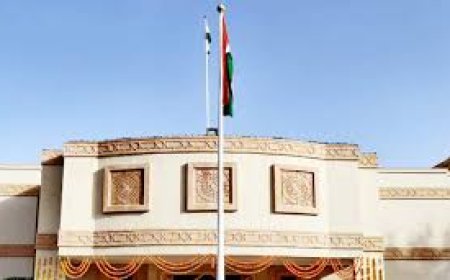3 convicted in Mysuru healer’s abduction and murder case
The Manjeri First Additional Sessions Court in Kerala on March 20, Thursday found Shaibin Ashraf (37), Shihabudheen (39), and Nishad (32) guilty of the abduction and murder of Mysuru-based traditional healer Shaba Sheriff. Nine other accused in the case were acquitted. The court will pronounce the sentencing on March 22.Twelve people were accused in the case, with Shaibin Ashraf as the prime accused. Since the police were unable to recover the victim’s body, murder charges could not be proven in court. The prosecution was able to establish only culpable homicide (Section 304), along with charges of kidnapping, assault, and criminal conspiracy (Section 120B) of the Indian Penal Code."Just a single hair strand recovered from the car of Shaibin, the first accused, played a crucial role in the case. The mitochondrial DNA (mtDNA) extracted from it helped establish the identity of Shaba Sheriff," said EN Krishnan Namboodiri, the public prosecutor, while speaking to the media.This was one of the rare crimes investigated by the Kerala Police, as the victim's body was never recovered. "This is the first time Kerala Police has proven a case using mtDNA. We spent nearly Rs 5.5 lakh on the test, and the court was convinced of the victim’s fate," Investigating Officer Vishnu C told the media.How a suicide attempt in Kerala revealed the brutal killing of a Mysuru healerThe crime came to light on April 29, 2022, in an unexpected manner when three men attempted self-immolation outside the Kerala Secretariat in Thiruvananthapuram. As police intervened, the three men were heard shouting accusations against Shaibin Ashraf, claiming they had worked for him for 13 years and that he was now trying to eliminate them. They also alleged that Shaibin had coerced them into committing a murder in Dubai.The three men – Zakeer, Noushad, and Salim, all natives of Sulthan Bathery in Wayanad district – were taken into custody, and their allegations led the police to launch an investigation into Shaibin Ashraf, a wealthy businessman based in Nilambur.Initially, the police were probing a burglary complaint filed by Shaibin on April 25, 2022, in which he alleged that Rs 3 lakh and a laptop had been stolen from his Mukkatta residence in Nilambur. However, as the investigation progressed, a murder that had gone undetected for years was revealed.The victim was Shaba Sheriff, a traditional healer from Mysuru who had been reported missing in August 2019. According to the statements given by the three men who attempted self-immolation, Shaibin and the other accused had kept Shaba in captivity for over a year, subjecting him to brutal torture before murdering him in October 2020.The investigation revealed that Shaibin had allegedly built a special soundproof room in his house to imprison Shaba. The room, equipped with air conditioning and a toilet, became Shaba’s prison. He was kept chained, tortured, and eventually murdered.During their suicide attempt at the Secretariat, the three men presented crucial evidence—a pen drive containing a video. The footage showed a man, later identified as Shaba Sheriff, inside a dimly lit room with dark walls, one of his legs chained to the bottom of the wall. The video played a pivotal role in unravelling the crime.According to the police, Shaibin wanted to obtain the ingredients of an ottamooli (a natural medicine) used to cure haemorrhoids, from Shaba. Traditional healers typically do not share their recipes, but Shaibin intended to manufacture and market the medicine. To achieve this, his men kidnapped Shaba from Mysuru and brought him to Nilambur.Police stated that Shaba died after being assaulted and struck in the chest. The accused then planned to dispose of his body. They purchased the necessary items from Nilambur town, dismembered the body, packed the remains, and disposed of them from the Edavanna bridge over the Chaliyar River. But despite an intensive search in the river, police could not recover any remains.Though the police were unable to recover the body, a DNA test on hair strands found in Shaibin’s car confirmed they belonged to Shaba Sheriff, providing crucial evidence in the case.

THE Manjeri First Additional Sessions Court in Kerala on March 20, Thursday found Shaibin Ashraf (37), Shihabudheen (39), and Nishad (32) guilty of the abduction and murder of Mysuru-based traditional healer Shaba Sheriff. Nine other accused in the case were acquitted.
The court will pronounce the sentence on March 22.
Twelve people were accused in the case, with Shaibin Ashraf as the prime accused. Since the police were unable to recover the victim’s body, murder charges could not be proven in court.
The prosecution was able to establish only culpable homicide (Section 304), along with charges of kidnapping, assault, and criminal conspiracy (Section 120B) of the Indian Penal Code.
"Just a single hair strand recovered from the car of Shaibin, the first accused, played a crucial role in the case. The mitochondrial DNA (mtDNA) extracted from it helped establish the identity of Shaba Sheriff," said EN Krishnan Namboodiri, the public prosecutor, while speaking to the media.
This was one of the rare crimes investigated by the Kerala Police, as the victim's body was never recovered. "This is the first time Kerala Police has proven a case using mtDNA. We spent nearly Rs 5.5 lakh on the test, and the court was convinced of the victim’s fate," Investigating Officer Vishnu C told the media.
The crime came to light on April 29, 2022, in an unexpected manner when three men attempted self-immolation outside the Kerala Secretariat in Thiruvananthapuram.
As police intervened, the three men were heard shouting accusations against Shaibin Ashraf, claiming they had worked for him for 13 years and that he was now trying to eliminate them. They also alleged that Shaibin had coerced them into committing a murder in Dubai.
The three men – Zakeer, Noushad, and Salim — all natives of Sulthan Bathery in Wayanad district – were taken into custody, and their allegations led the police to launch an investigation into Shaibin Ashraf, a wealthy businessman based in Nilambur.
Initially, the police were probing a burglary complaint filed by Shaibin on April 25, 2022, in which he alleged that Rs 3 lakh and a laptop had been stolen from his Mukkatta residence in Nilambur. However, as the investigation progressed, a murder that had gone undetected for years was revealed.
The victim was Shaba Sheriff, a traditional healer from Mysuru who had been reported missing in August 2019. According to the statements given by the three men who attempted self-immolation, Shaibin and the other accused had kept Shaba in captivity for over a year, subjecting him to brutal torture before murdering him in October 2020.
The investigation revealed that Shaibin had allegedly built a special soundproof room in his house to imprison Shaba.
The room, equipped with air conditioning and a toilet, became Shaba’s prison. He was kept chained, tortured, and eventually murdered.
During their suicide attempt at the Secretariat, the three men presented crucial evidence—a pen drive containing a video. The footage showed a man, later identified as Shaba Sheriff, inside a dimly lit room with dark walls, one of his legs chained to the bottom of the wall. The video played a pivotal role in unravelling the crime.
According to the police, Shaibin wanted to obtain the ingredients of an ottamooli (a natural medicine) used to cure haemorrhoids, from Shaba. Traditional healers typically do not share their recipes, but Shaibin intended to manufacture and market the medicine. To achieve this, his men kidnapped Shaba from Mysuru and brought him to Nilambur.
Police stated that Shaba died after being assaulted and struck in the chest. The accused then planned to dispose of his body. They purchased the necessary items from Nilambur town, dismembered the body, packed the remains, and disposed of them from the Edavanna bridge over the Chaliyar River. But despite an intensive search in the river, police could not recover any remains.
Though the police were unable to recover the body, a DNA test on hair strands found in Shaibin’s car confirmed they belonged to Shaba Sheriff, providing crucial evidence in the case.






































































